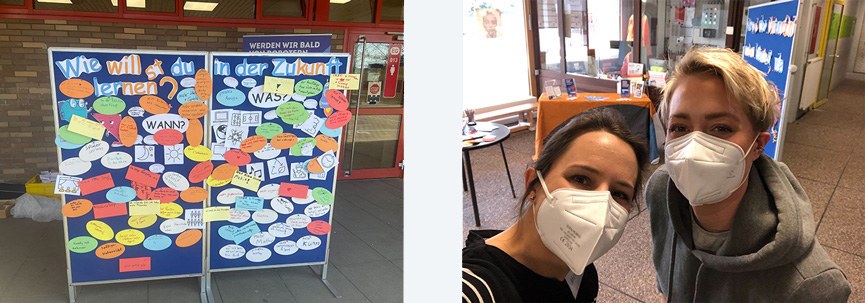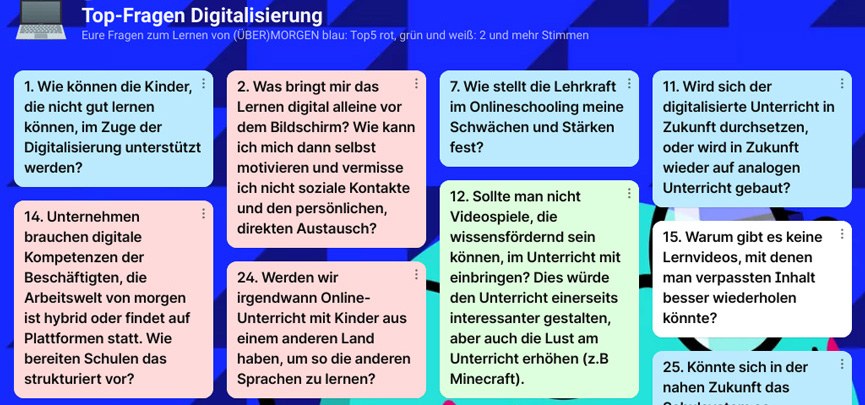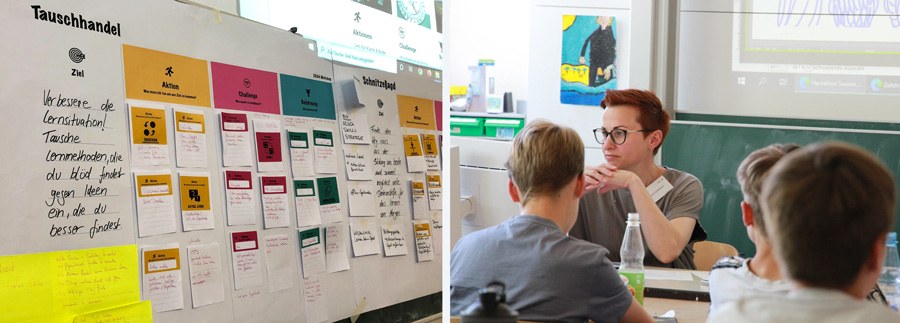Implementing a whole range of exchange formats in just eleven months and developing an online game at the same time – together with students?
This was exactly what we wanted to achieve with our project “enorM – How Do We Want to Learn in the Future?”, as part of the Science Year 2022: an intensive exchange between society and science, especially between students and researchers on the topic of education.
- Mobilisation phase from February to April 2022: collecting questions in different ways
- Interaction phase from April to December 2022: work on the questions in exchange formats
The project consisted of two phases. In the first phase – from February to April 2022 – the main aim was to collect questions from students about tomorrow's learning. The questions could be submitted via the website. However, over a period of four weeks, we also visited six schools in Hesse and Baden-Württemberg to talk to students (and teachers) who otherwise rarely express themselves or who, for various reasons, are unable to participate online. We visited two grammar schools, a primary school, a special education school, a middle school and a secondary school.
Due to the short duration of the project, we made contacts during the application phase so that we could be on the road in time for the start of the project. For the school visits, we designed an interactive stall where questions could be written on cards. The questions could also be drawn, spoken or asked in conversation. We adapted the interactive stall for each school visit to meet students’ needs as much as possible. The number of pupils involved depended on the needs and possibilities of each school.
»We spoke to whole year groups, individual classes or the whole school.«

We collected questions via the website and in on-site surveys. Students could formulate their own questions and ideas and give more weight to those of other students using sticky dots. At the end of the first phase, we organised a three-hour digital student camp with nine students. Together with presenter Nico Brugger and us, they prioritised the questions received, which had previously been divided into six broad topic clusters: Digitization, Individual Learning, Wellbeing & School Life, New Teachers, New Places and New Subjects & Skills. At the end of the camp, the questions were summarised and focused in such a way that five 'top questions' from each area could be taken onto the second phase of the project.

In Exchange Formats, Students and Researchers Worked on Selected Questions about Learning in the Future – and Developed an Online Game in Parallel
Our aim was to work on as many questions as possible in different exchange formats between May and December 2022. The exchange formats should also provide ideas as answers to the questions – and these, in turn, should be incorporated into an online game. Together with the design agency Archimedes Exhibitions, a workshop was held at a school in Baden-Württemberg at the end of April 2022 to develop and define key elements of the future game with the students.

At the same time, we launched a podcast about learning in the future with three interested students. Over the course of several weeks, the students worked with the communications department to develop a concept, drafted interview questions and conducted interviews with DIPF education experts.
Students also had the opportunity to talk to our education experts in two other exchange formats: our "Book a Question" series consisted of four digital sessions. One was held as part of Digitaltag (Digital Day) 2022, while the other three were digital lessons with interested schools. They chose a question to discuss and DIPF researchers with a suitable research area joined the class via Zoom.
The exchange formats:
- “Future School” Podcast
- Digital series "Book a Question”
- Hackathon
Shortly before the summer holidays in Hessen, in July 2022, we also held a hackathon at a secondary school in Frankfurt. Together with 28 eighth grade students, five teachers, seven scientists and a host, we held four sessions during a whole school day.
At the same time further development of the online game took place. Based on the April workshop, the agency created a dummy version that was tested by the students and revised based on their feedback. All the ideas that emerged from the joint exchange between students and researchers on learning in the future were integrated into the game.
All events were evaluated using online questionnaires. Whenever possible, feedback was used immediately to adapt subsequent sessions.